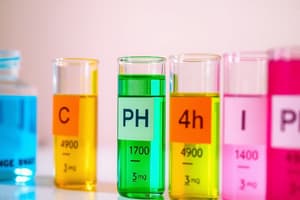Podcast
Questions and Answers
Which of the following salts is formed from the reaction between sulfuric acid and potassium hydroxide?
Which of the following salts is formed from the reaction between sulfuric acid and potassium hydroxide?
- Sodium chloride
- Potassium sulfate (correct)
- Sodium sulfate
- Potassium chloride
What is the product formed when hydrochloric acid reacts with calcium hydroxide?
What is the product formed when hydrochloric acid reacts with calcium hydroxide?
- Water
- Calcium chloride (correct)
- Calcium sulfate
- Calcium hydroxide
What ion is produced when sodium hydroxide dissolves in water?
What ion is produced when sodium hydroxide dissolves in water?
- Protons (H⁺)
- Sodium ions (Na⁺) (correct)
- Hydroxide ions (OH⁻)
- Chloride ions (Cl⁻)
Which of the following is a property of acids?
Which of the following is a property of acids?
In an acid-base reaction, what is the role of water?
In an acid-base reaction, what is the role of water?
Which substance would be considered strongly basic on the pH scale?
Which substance would be considered strongly basic on the pH scale?
What is the significance of a pH of 7 on the pH scale?
What is the significance of a pH of 7 on the pH scale?
Which theory historically focused on acid-base chemistry teaching along with Arrhenius and Bronsted-Lowry?
Which theory historically focused on acid-base chemistry teaching along with Arrhenius and Bronsted-Lowry?
How does the pH scale represent a 10-fold change in hydrogen ion concentration?
How does the pH scale represent a 10-fold change in hydrogen ion concentration?
What distinguishes the properties of acids from bases?
What distinguishes the properties of acids from bases?
Which aspect of daily life is directly impacted by understanding acid-base chemistry?
Which aspect of daily life is directly impacted by understanding acid-base chemistry?
How does the educational value of the historical development of acid-base chemistry support students' understanding according to the text?
How does the educational value of the historical development of acid-base chemistry support students' understanding according to the text?
Flashcards are hidden until you start studying
Study Notes
Acid-Base Chemistry: A Comprehensive Overview
Acid-base chemistry is a fundamental branch of chemistry that encompasses the behavior and reactions of acids, bases, and their interactions. To fully understand this topic, it's helpful to explore the origins of the field, the nature of acids and bases, and how they participate in reactions that shape our daily lives.
Types of Salts
Salts are formed when acids and bases react, and their properties depend on the acids and bases involved. For example, sodium chloride (NaCl) is a salt formed when hydrochloric acid (HCl) reacts with sodium hydroxide (NaOH).
Properties of Acids
Acids are substances that dissolve in water to produce hydrogen ions (H⁺) and anions. They have a sour taste and can neutralize bases. Common examples of acids include hydrochloric acid (HCl) and sulfuric acid (H₂SO₄).
Properties of Bases
Bases are substances that dissolve in water to produce hydroxide ions (OH⁻) and cations. They have a bitter taste and can neutralize acids. Examples of bases include sodium hydroxide (NaOH) and calcium hydroxide (Ca(OH)₂).
Acid-Base Reactions
In a neutralization reaction, acids and bases react together to form water and a salt. For example, when hydrochloric acid (HCl) reacts with sodium hydroxide (NaOH), water (H₂O) and sodium chloride (NaCl) are produced.
[ \text{HCl} + \text{NaOH} \rightarrow \text{H₂O} + \text{NaCl} ]
pH Scale
The pH scale quantifies the acidity or alkalinity of a solution. A pH of 7 is defined as neutral, while values less than 7 indicate acidic solutions and values greater than 7 indicate alkaline or basic solutions. The pH scale uses a logarithmic scale, with each unit change representing a 10-fold change in hydrogen ion concentration.
Changing How We Teach Acid-Base Chemistry
Historically, the teaching of acid-base chemistry has focused on the Arrhenius, Bronsted-Lowry, and Lewis theories. However, a more modern approach emphasizes the educational value of the historical development of the field, supporting students' understanding of the nature of science and its limitations. This approach aims to help students develop a more accurate and nuanced understanding of acid-base chemistry.
Understanding acid-base chemistry is vital for comprehending numerous aspects of daily life, from the action of soaps and detergents to the pH levels in soil and the human body. As you've learned, this field has three primary components: understanding the types of salts, the properties of acids and bases, the nature of acid-base reactions, and the pH scale. By mastering these concepts, you'll be equipped to grasp the inner workings of this essential area of chemistry.
Studying That Suits You
Use AI to generate personalized quizzes and flashcards to suit your learning preferences.




